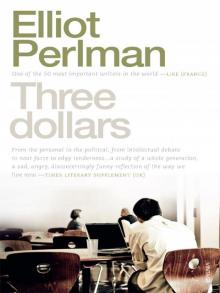- Home
- Elliot Perlman
Maybe the Horse Will Talk Page 5
Maybe the Horse Will Talk Read online
Page 5
With a continuation of the feeling that he had nothing to lose, he picked up the phone and invited her to show him her idea of the best coffee in the neighbourhood. Her response brought an immediate return of the feeling that he had lived with for much longer than the feeling that he had nothing to lose – namely, that he had everything to lose. Jessica sounded strange, cold and distant, almost as though she didn’t remember who he was or didn’t like what she remembered. She said she wasn’t able to meet him for coffee, or more exactly, ‘That’s not going to work for me.’
Maserov felt as though he’d asked her for a date and she had declined. She was far from the first woman who had. The last woman he’d asked on a date had been the woman who had become his wife, Eleanor, and she had not declined then. But after years of marriage and two children, Maserov was confident she’d decline if he asked her out now. The sudden Proustian rush of rejection sheeted home to Maserov just how fragile his what-the-hell-I’ve-got-nothing-to-lose attitude really was.
Perhaps Eleanor had been right. Perhaps he should have stayed at Freely Savage, biding his time until they culled the Second Years who had just become Third Years and him among them. He was doubting the wisdom of having even approached Malcolm Torrent when the phone on his desk rang. The only person who knew that he occupied that room was Jessica.
‘I’m so sorry,’ she said. ‘I was trapped in an executive’s room and couldn’t speak freely.’
‘Didn’t I call your office extension?’ Maserov asked.
‘Yes, you did, but I had to transfer my line to his office, so I was talking to you from there. I’ve only just sneaked out and I have to go back in there. I can’t meet you for coffee. Sorry.’
‘No, I gathered that. It’s fine,’ Maserov said.
‘But I was thinking of lunch,’ Jessica volunteered. ‘Do you have lunch plans?’ Maserov’s emotions now lurched the other way. They hastily arranged to meet at the bottom of the building at 12.55 pm. Maserov put the phone down and just sat there for a moment. Although he didn’t understand why, he thought he might cry.
It was a warm and sunny autumn day and the city streets were blooming with lightly dressed women, lycra-clad superheroes cunningly disguised as bicycle couriers on amphetamines, ripped-off foreign students hopelessly lost and staring at their smartphones, avant-garde art students from the south-eastern suburbs clutching their caffeine fixes, street musicians sustained by the hope of reaching somebody, and a multitude of homeless people hopped up on cocktails of anti-dandruff shampoo, nail-polish remover and methylated spirits. Stephen Maserov awkwardly shook Jessica Annand’s hand when they met in the foyer of the building.
‘We’ve met, remember?’ she said, looking down at his hand taking hers. ‘Do you shake the hand of people you have lunch with at Freely Savage?’
‘I can’t remember. I mostly eat alone.’
‘You’re not very gregarious, are you?’
‘No one there is very gregarious, really. Sociability is not a trait they tend to value. It can’t be measured in six-minute billable units. Nor is it consistent with the competition between employees the firm works so hard to cultivate.’
They sat down opposite each other in the nearby Nashi sandwich and coffee bar, each ordering a handcrafted sandwich with fillings the establishment promised were exotic. It was noisy and crowded but their table was in a slightly darkened section that recommended itself to professionals with an inclination towards a midday fix of alcohol, anxiolytics and office intrigue. Nobody spoke for a little while. Maserov was not afraid of silences. Jessica was less comfortable with them.
‘I hope you don’t mind my asking,’ Jessica began once they had ordered, ‘but what’s the nature of the work that’s led you to our offices?’
‘No, I don’t mind your asking. And . . . I’m thinking I’m going to need someone’s help.’
‘So it might as well be me?’ Jessica asked.
‘Yeah, that didn’t . . . um . . . that didn’t really come out right. Can I . . . Let me just . . .’
‘You want to tell me the whole story?’ Jessica asked.
‘A lot of it, yeah.’
And so Maserov told her what had happened the previous morning with Hamilton and how he had learned that within a few months, when the Second Years were becoming Third Years, there was going to be another big cull and that he would be included and why. He told her how he had buttonholed Malcolm Torrent, correctly guessed the sweet spot of his discontent and, in return for twelve months’ job protection, promised to rid him of his problem.
‘It seems to have worked but I think I’m going to need a Torrent Industries email address.’
‘Why?’
‘I don’t know what Hamilton’s going to do but he’s not going to take this lying down. He could try to shut me out or terminate my email account. He could do anything.’
‘You really think he would sabotage your attempt to solve the problem of his most important client?’ Jessica asked.
‘Definitely. It’s just a matter of when and how. He might even fire me.’
‘I thought you said he agreed by return email to Mr Torrent to give you twelve months to work on nothing but Mr Torrent’s problem.’
‘He did. I have a copy of that email. But if push comes to shove, and with Hamilton shove usually arrives first and in a limo, how am I going to enforce this deal? I’m entirely dependent on the goodwill of Torrent and he’s only just met me. There’s no reason he should have any regard for me,’ Maserov said.
Jessica thought for a moment. ‘Should push come to shove, you need to remind Mr Torrent of how little Hamilton, in contrast to you, cared about the problem.’
‘You’re right,’ said Maserov, impressed.
‘I can get you a Torrent Industries email address. That’s easy. I can do that after lunch. What else do you need?’
‘Well, I realised that I don’t know the names of any of the alleged Torrent Industries staff members involved in the . . . any of the people Mr Torrent wants me to look after.’
‘You haven’t told me precisely what you’re looking into.’
‘Oh, it’s pretty dry, boring legal stuff . . . building codes, regulations,’ Maserov lied. He was worried that if she knew that he was trying to protect alleged sexual harassers he’d kill any chance of her helping him. Worse, she’d probably consider him the enemy and a creep.
‘Really? Building regulations, and Hamilton won’t look into it? That doesn’t make any sense. Why won’t he look into it?’
‘I don’t know yet. I may never know. Look, I realise this whole thing probably looks pretty cloak and dagger, especially to someone who’s happy with their professional situation.’
‘Happy with my professional situation; are you kidding?’
‘You seem —’
‘Look, a lot of your description of the mood or the atmosphere of Freely Savage applies to Torrent Industries too.’
‘Really? It seems so . . . I don’t know . . . benign.’
‘That’s because you’ve been at Torrent Industries for two hours.’
‘You’re not so happy there?’
They barely knew each other but that didn’t seem to inhibit her.
‘Oh Jesus, where do I start? I had all these plans when I first came here. I’ve got a Masters in psychology. I never intended to work here or not for long. My career ambitions are wilting before me like lettuce leaves.’
‘Hmm . . . lettuce leaves,’ echoed Maserov.
‘I had plans for a career in organisational psychology but I got sidetracked by the need to eat and pay rent. There weren’t any other jobs, not ones commensurate with my education and the debt it left me with. Torrent Industries kind of seduced me with its capacity to satisfy my need to sleep under a roof and eat on a semi-regular basis. I’ll be honest, at first I was fooled by the opulent offices and the way the money automatically appeared in my bank account every two weeks. But the disappointment began in earnest when I found I was spending significan
t parts of my day ensuring there was sufficient alfalfa on each side of the sandwich platters I was instructed to order and sometimes to deliver for in-house seminars. This was not what I had aspired to. I had always imagined a robust, exciting career, perhaps blossoming into life as an academic. Can I tell you what my ambition used to be?’
‘Please do.’
‘No, I probably shouldn’t. I’ve only just met you.’
‘Well, I don’t want you to feel uncomfortable,’ Maserov said, hoping she’d tell him everything as soon as possible, the more personal the better.
‘I saw myself giving TED Talks.’
‘TED Talks?’
‘Yes, my plan was to gain insight into the corporate coalface at Torrent Industries and roll that into one or more TED Talks and eventually into a book.’
‘Forgive me, but that’s your ultimate ambition, to give a TED Talk?’
‘I already have an MA in psychology.’
‘Yeah, that’s what I mean. I would have thought that was much more impressive than giving a TED Talk.’
‘More people have an MA than give TED Talks,’ Jessica explained.
‘Yes, and more people have an MA than open a McDonald’s franchise.’
‘Do you think so?’
‘On a global basis, I’d say that’s probably right.’
‘Accepting that this is true, which I don’t unequivocally, what’s your point?’
‘My point,’ Maserov explained slowly as he tried to remember his point, ‘my point is that it’s a mistake to think that something being rarer than something else makes it more intrinsically valuable.’
Jessica was enjoying having her ambition gently challenged by Maserov’s logic. He was the first person in the work environment to whom she’d confided this. She looked down at her plate briefly and moved some salad around slowly in a clockwise direction before looking up and continuing.
‘You do realise I mean the real TED Talks, I don’t mean any of your locally organised, community-forum-type talks. I’m talking Vancouver, I’m talking Clintons; Hillary and Bill . . . and Chelsea.’
‘Oh, you are serious!’
‘Are you perhaps laughing at me?’
‘Um . . . Yes, I think so, but gently.’
‘The TED Talk would be a stepping stone. Did I mention that?’
‘Yes.’
‘To a book,’ Jessica continued.
‘You said.’
They sat looking at each other.
‘Why are you looking at me like that?’ she asked him.
‘I’m not aware of the way I’m looking at you, only that I am looking at you. And I’m thinking you’ve already achieved something greater, more impressive, than your stated ambition.’
‘Look,’ said Jessica, ‘I’m Indian. Do you know what that means?’
‘Um, not in this context, no.’
‘It means my parents are Indian.’
‘Yeah, so?’
‘They can’t see a Master of Arts degree. I mean they can’t show it to friends and family. They can show a piece of paper but that’s not going to cut it with extended family in Richmond Hill, Harrow and Bangalore.’
‘But a TED Talk they can see,’ Maserov said, feeling the weight of the penny dropping.
‘Yes, they can watch it over and over again, each time my parents pretend that they haven’t already sent the link to this or that aunt, uncle or cousin who in turn might send it on even further.’
‘Forgive me, I now see the importance of the TED Talk, a considered and even noble ambition. You want to please your parents,’ said Maserov sympathetically.
‘Yes,’ said Jessica, unable to hide her sense of defeat. ‘But after two years at Torrent Industries, these ambitions seem no nearer to realisation than when I started. The way it looks right now, I’d have enough trouble getting them to send me to a TED Talk.’
‘They’re anti-TED Talk?’ Maserov asked. ‘I had no idea.’
‘It’s worse than that,’ Jessica continued. Now she was almost whispering. ‘Do you know who Frank Cardigan is?’
‘No,’ answered Maserov, also in a whisper. ‘Who’s Frank Cardigan?’
‘He’s a Torrent Industries executive, a rising star. Everybody there loves him, or at least those above him do. He’s recently been moved to the Urban Infrastructure department to restore its viability after they experienced some crushing losses. In just eighteen months he managed to return Urban Infrastructure to profitability.’
‘That sounds impressive,’ said Maserov, not terribly impressed. In truth, she didn’t seem to be either.
‘Yeah, everyone is just so impressed with him, he thinks he’s earned the right to pepper his conversations with, “I’m a great believer in . . .” He’s a great believer in this. He’s a great believer in that. He made the company some money and now he’s developing ad hoc belief systems.’
‘It sounds very annoying, I realise, but why is he your problem?’
‘Yeah, he shouldn’t be my problem. He became my problem a while back when he was required to write a regular column for a bimonthly professional publication, a newsletter for the construction industry, Construction News. It’s sponsored by Torrent Industries and all employees, all those at corporate HQ, are expected to read it.’
‘I’ve never known whether bimonthly denotes something that happens twice a month or every two months. Sorry, that’s probably not relevant,’ apologised Maserov.
‘Actually it is relevant. I’ll explain. When Frank Cardigan’s star began to rise it was none other than Mr Torrent himself who chose Frank to write this column. As you might have guessed, Frank’s unctuous gratitude to Mr Torrent for choosing him was followed by a call to HR to ask for assistance.’
‘He wanted someone to write it for him and they chose you.’
‘Exactly.’
‘Why did they choose you?’ Maserov asked.
‘Because . . . Okay.’ Jessica took a breath. ‘I’d written some discussion papers for the department and Aileen van der Westhuizen, the director of HR, knew I could write. So when she started getting pestered by Frank Cardigan in his search for a ghostwriter she volunteered me. She said I really had a way with words.
‘And that was the beginning of my Frank Cardigan problem. I had to start writing his shitty columns for him. Mr Torrent read some of them, liked them, and so now I was really stuck. Frank Cardigan, elated, became obsessive about his “audience reach”. He wanted to know who in the firm was really reading his articles, the ones I was writing.
‘I did manage to get him to agree to “write” the columns every two months. Citing my background in psychology, I put to him that adopting the every-two-months definition would leave people hanging out, plain desperate to read them.’
‘He accepted that?’
‘He’s astonishingly stupid. And arrogant. So anyway, now he considers me his “lucky charm”. He’s even called me that.’
‘To your face?’
‘To any part of me he can get near.’
‘Is he sleazy?’
‘He works at it but so far I’ve managed to keep a certain distance between us. But it’s not easy. He wants to run every decision he makes past me, which is crazy because I don’t know anything about infrastructure; urban, suburban, rural or extra-terrestrial.’
‘How do you write his columns for him?’
‘We have these meetings where we scan the business pages of one or other newspaper – local, interstate, international – it doesn’t matter. There he selects a topic, which he gives me. I write it down and go back to my office and there I consult Wikipedia. Then I change the verbs. Then I add adverbs. Then I go to the thesaurus and I change as many nouns as I can.’
‘Are the columns a success?’
‘Well, he’s turned the division around so people think he knows what he’s talking about.’
‘Does he?’
‘How can he? I’m writing it and my background’s in organisational psychology. So he thinks I�
�m his lucky charm and I can’t seem to break away from him, not completely.’
‘You can’t appeal to your higher-ups?’
‘I haven’t got a case. He keeps recommending pay rises and bonuses for me.’
‘So that’s good, right?’
‘Yeah, but I can’t be dependent on his good graces for my employment. What happens when they find out he’s an idiot, which they eventually will? Not only that, this isn’t how I imagined my career, alternating between organising bagels and alfalfa for thirty people and ghostwriting for an asinine construction executive. And he’s not merely asinine. Frank Cardigan is a vain, self-obsessed, sexist, manipulative careerist who values people only for as long as he needs them. He’s a great user of people.’
‘They’re everywhere, let me assure you. I don’t have any ready advice. I wish I could help you.’
‘You might be able to. If whatever it is you’re working on here is so important to Torrent then maybe you could ask for my assistance in which case your stuff would take precedence over his crap.’
Maserov tried to hide his discomfort. It was not that he didn’t want to help her. He really liked her. But if she became involved in his work in any way she’d soon learn that he was working for alleged sexual harassers and she’d share the contempt for him Eleanor felt when he’d told her about his arrangement with Malcolm Torrent.
‘Yes, of course, if it’s at all possible I can definitely try to get you involved,’ Maserov heard himself say. Maybe he wouldn’t be able to. Maybe he would be, but in a way that hid from her what he was really doing. Maybe the horse would talk.
IV
Armed with a Torrent Industries email address Jessica had supplied, Maserov was able to obtain the names and the files of the alleged sexual harassers employed by Torrent Industries and the name of the Freely Savage lawyer assigned to clear up the mess or at least to pretend to. He was a man called Featherby, an eighth-year lawyer who lived in one of three pinstriped suits. Maserov had had very little to do with Featherby but he’d been struck by his extreme thinness, his near two-dimensionality, and by the tenacity with which he clung to the pinstripes and they, in turn, to him. Featherby seemed unconcerned that no one else in the developed world was currently wearing pinstripes in a corporate setting without irony and he would, no doubt, remain unaware when he would one day appear at the vanguard of their triumphant return to boardrooms everywhere. He had straight, stringy, thin hair that wasn’t yet grey but had been rehearsing for its autumn all his life. Maserov could tell it was a life that had begun in an expensive private school with its own carefully nurtured grand tradition of manicured gardens, rote-learned Latin, extreme orienteering, vast tracts of perfectly cut, moist, lush grass to cradle participants in various blood sports and random extracurricular outbreaks of non-consensual sodomy – a school that had taken great pains to attenuate its students’ vowels and stiffen their consonants. It had inflicted these and other torments on him and had billed his parents handsomely for the trouble and for his board.

 Maybe the Horse Will Talk
Maybe the Horse Will Talk The Adventures of Catvinkle
The Adventures of Catvinkle The Street Sweeper
The Street Sweeper Seven Types of Ambiguity
Seven Types of Ambiguity Three Dollars
Three Dollars The Reasons I Won't Be Coming
The Reasons I Won't Be Coming